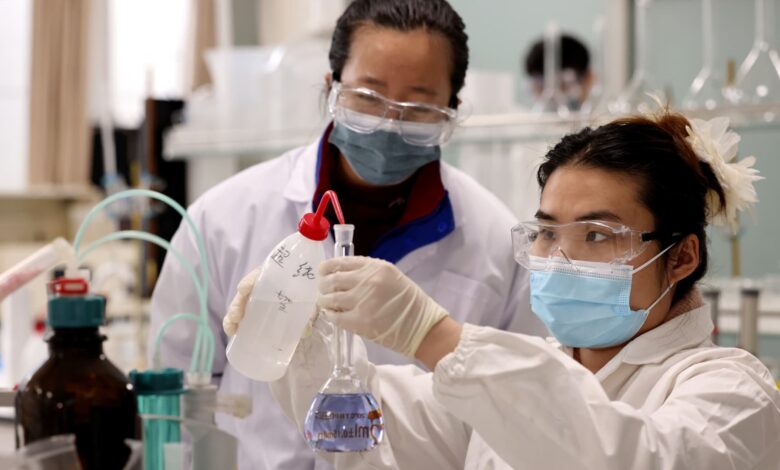China’s quickly gaining an edge over the U.S. in biotech

China’s Rapid Rise in Biotechnology: A Threat to U.S. Dominance?
In the realm of technological advancements, the competition between the United States and China has been well-documented, particularly in areas such as artificial intelligence. However, recent studies have shed light on China’s significant progress in biotechnology, particularly in the fields of drug development and agriculture.
A report released by the Harvard Belfer Center for Science and International Affairs highlighted China’s potential to overtake the United States in biotechnology, citing the country’s dominance in pharmaceutical production and manufacturing. The report also emphasized China’s abundance of human talent and a more flexible regulatory environment, which allows for faster innovation and development processes compared to the U.S.
The U.S. National Security Commission on Emerging Biotechnology echoed these concerns in a recent report, warning of a potential “ChatGPT moment” in biotechnology. The bipartisan commission emphasized the need for a strategic approach to ensure that the U.S. remains competitive in the biotech sector, recommending a significant investment of at least $15 billion over the next five years.
China’s growing strength in biotechnology has already attracted the attention of major pharmaceutical companies, with several recent acquisitions of China-developed drugs. The influx of investments from companies like AstraZeneca further underscores China’s emergence as a key player in the global biotech industry.
While China’s progress in biotechnology is undeniable, the U.S. faces challenges in maintaining its competitive edge. Reports of layoffs and vacant labs in biotech hubs like Cambridge and Boston highlight the need for a comprehensive strategy to bolster the domestic biotech sector.
China’s success in biotechnology can be attributed to its long-term planning and state-led initiatives, which have provided crucial support for the industry since as early as 2007. In contrast, the U.S. lacks a cohesive biotechnology strategy, putting it at a disadvantage in the race for technological dominance.
As tensions between the U.S. and China continue to escalate, the prospect of cooperation in biotechnology appears unlikely. Experts predict that the future of biotech development will be inherently global, with companies like Insilico Medicine leveraging a diverse team across different regions to drive innovation.
Ultimately, the rapid expansion of China’s biotech industry poses a significant challenge to the U.S.’s longstanding dominance in the field. As China continues to make strides in biotechnology, the U.S. must prioritize strategic investments and collaboration to ensure its competitiveness in this critical sector. The Benefits of Meditation
Meditation is a practice that has been used for thousands of years by people all over the world to improve their mental, emotional, and physical well-being. While it may seem like a simple practice, the benefits of meditation are profound and far-reaching.
One of the primary benefits of meditation is its ability to reduce stress and anxiety. When we meditate, we are able to quiet our minds and focus on the present moment, which can help to alleviate the worries and concerns that often plague us. By practicing meditation regularly, we can train our minds to be more resilient in the face of stress, allowing us to respond to challenging situations with greater calm and clarity.
In addition to reducing stress, meditation has also been shown to improve our overall mental health. Studies have found that regular meditation practice can help to reduce symptoms of depression and anxiety, as well as improve our ability to focus and concentrate. By quieting the mind and fostering a sense of inner peace, meditation can help us to better navigate the ups and downs of life with grace and resilience.
Meditation also has numerous physical benefits. Research has shown that meditation can help to lower blood pressure, improve sleep, and boost our immune system. By reducing stress and promoting relaxation, meditation can help to alleviate the physical symptoms of stress, such as headaches, muscle tension, and digestive issues. In this way, meditation can help us to live healthier, more vibrant lives.
One of the most powerful benefits of meditation is its ability to cultivate a sense of connection and compassion towards ourselves and others. By quieting the mind and tuning into our inner selves, we can develop a greater sense of self-awareness and self-acceptance. This can help us to let go of negative self-talk and limiting beliefs, and instead cultivate a sense of self-love and compassion.
Furthermore, meditation can help us to cultivate empathy and compassion towards others. By fostering a sense of connection and understanding towards others, we can develop more meaningful and fulfilling relationships, as well as contribute to a more compassionate and harmonious world.
In conclusion, the benefits of meditation are vast and profound. By practicing meditation regularly, we can reduce stress, improve our mental and physical health, cultivate a sense of connection and compassion, and live more fulfilling and vibrant lives. Whether you are new to meditation or have been practicing for years, incorporating meditation into your daily routine can help you to thrive and flourish in all areas of your life.





